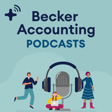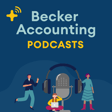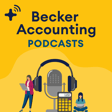
Balancing the Future Ep. 14 - Success Built on Learning and Listening with Stephanie Johnson
Stephanie Johnson, Head of Audit for Brokerage Coverage at Fidelity, talks with host Christopher Mitchell about the practice of internal auditing, why she loves the job, and the skills that internal auditors bring to the table. Without a background in accounting, she shares her path into the profession and the importance of self-advocacy, mentorship, and a curious spirit to grow your career. She also advocates for the importance of internal auditors and their role in navigating organizational changes like AI integration.
Earn CPE by listening to this podcast through a Becker Prime CPE subscription.
Listen to this episode through your Becker LMS platform to complete practice questions, pass the final exam, and earn CPE credit.
Already a Becker Prime CPE customer? Login here.
Have access to Becker CPE through your employer? Earn CPE credit for this podcast however you consume Becker CPE, either through your company’s LMS or via the Becker platform. Not sure where to log in? Check with your CPE admin.
Learn more about CPE Podcasts from Becker: https://www.becker.com/cpe/becker-podcasts


